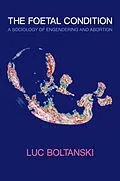Abortion is a contentious issue in social life but it has rarely
been subjected to careful scrutiny in the social sciences. While
the legalization of abortion has brought it into the public domain,
it still remains a sensitive topic in many cultures, often hidden
from view and rarely spoken about, consigned to a shadowy
existence.
Drawing on reports gathered from hospital settings and in-depth
interviews with women who have had abortions, Luc Boltanski sets
out to explain the ambiguous status of this social practice.
Abortion, he argues, has to remain in the shadows, for it reveals a
contradiction at the heart of the social contract: the principle of
the uniqueness of beings conflicts with the postulate of their
replaceable nature, a postulate without which no society would
achieve demographic renewal.
This leads Boltanski to explore the way human beings are
engendered and to analyze the symbolic constraints that preside
over their entry into society. What makes a human being is not the
foetus as such, ensconced within the body, but rather the process
by which it is taken up symbolically in speech - that is, its
symbolic adoption. But this symbolic adoption presupposes the
possibility of discriminating among embryos that are
indistinguishable. For society, and sometimes for individuals, the
arbitrary character of this discrimination is hard to tolerate. The
contradiction is made bearable, Boltanski shows, by a grammatical
categorization: the "project" foetus - adopted by its
parents, who use speech to welcome the new being and give it a name
- is juxtaposed to the "tumoral" foetus, an accidental
embryo that will not be the object of a life-forming project.
Bringing together grammar, narrations of life experience and an
historical perspective, this highly original book sheds fresh light
on a social phenomenon that is widely practised but poorly
understood.
Autorentext
Luc Boltanski is professor of sociology at the École des hautes études en sciences sociales, Paris. His many books in English include, The New Spirit of Capitalism, On Critique and Love and Justice as Competences.
Zusammenfassung
Abortion is a contentious issue in social life but it has rarely been subjected to careful scrutiny in the social sciences. While the legalization of abortion has brought it into the public domain, it still remains a sensitive topic in many cultures, often hidden from view and rarely spoken about, consigned to a shadowy existence.
Drawing on reports gathered from hospital settings and in-depth interviews with women who have had abortions, Luc Boltanski sets out to explain the ambiguous status of this social practice. Abortion, he argues, has to remain in the shadows, for it reveals a contradiction at the heart of the social contract: the principle of the uniqueness of beings conflicts with the postulate of their replaceable nature, a postulate without which no society would achieve demographic renewal.
This leads Boltanski to explore the way human beings are engendered and to analyze the symbolic constraints that preside over their entry into society. What makes a human being is not the foetus as such, ensconced within the body, but rather the process by which it is taken up symbolically in speech - that is, its symbolic adoption. But this symbolic adoption presupposes the possibility of discriminating among embryos that are indistinguishable. For society, and sometimes for individuals, the arbitrary character of this discrimination is hard to tolerate. The contradiction is made bearable, Boltanski shows, by a grammatical categorization: the project foetus - adopted by its parents, who use speech to welcome the new being and give it a name - is juxtaposed to the tumoral foetus, an accidental embryo that will not be the object of a life-forming project.
Bringing together grammar, narrations of life experience and an historical perspective, this highly original book sheds fresh light on a social phenomenon that is widely practised but poorly understood.
Inhalt
Introduction 1
1 he Anthropological Dimensions of Abortion 11
2 The Two Constraints on Engendering 39
3 Understandings 60
4 The Parental Project 90
5 Constructing Foetal Categories 125
6 The Justification of Abortion 158
7 The Experience of Abortion 193
Conclusion: Forgetting Abortion 233
Notes 251
Works Cited 299
Index 317
